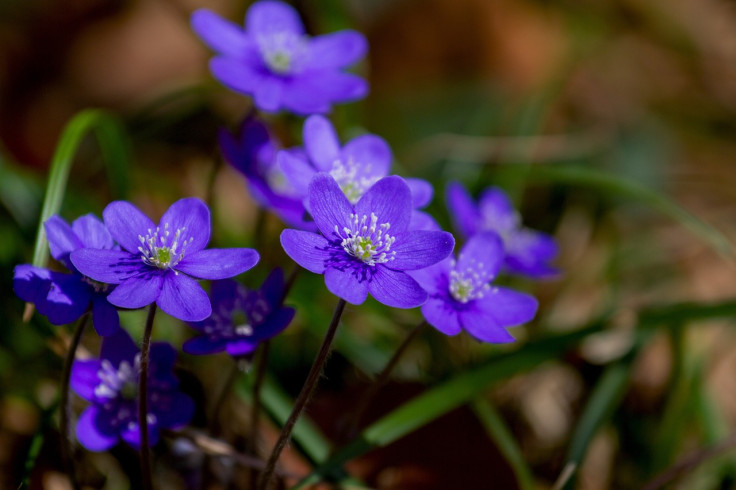
Every little girl creates a world of happiness around her with her innocence and charm. Therefore, it is important that she is given the most beautiful name. As you await the birth of your little angel, here is a look at some of the most enchanting baby girl names you'll love this 2024.
30.
Winter
The usage of nature-inspired and seasonal names has persisted across different cultures and regions. The name "Winter" has Germanic origins, and is derived from the Old English word "wintra," which means "winter" or "the cold season." It is related to the Proto-Germanic word "wintraz." The use of seasonal names is not uncommon in many cultures and languages. In this case, the name likely originated as a descriptive term for a person born during the winter months or may have been given to evoke a sense of the season itself.
29.
Willow
"Willow" is derived from the Old English word "welig." The Old English word itself has Germanic roots, tracing back to the Proto-Germanic word "welugô." The willow tree has cultural and symbolic significance in various societies. In ancient times, willow trees were associated with qualities such as flexibility and resilience due to their pliant branches. The name Willow may have been given to individuals as a reference to these symbolic characteristics or simply because of a connection to the tree itself.
28.
Violet

"Violet" came from the word "viola," which means "violet" or "purple" in Latin. The word "viola" has roots in the earlier Greek word "ion," referring to the violet flower. The name Violet has been used since the 19th century, and it became more popular during the Victorian era when floral and nature-inspired names were in vogue. The violet flower is often associated with qualities such as modesty, faithfulness, and virtue. As a result, the name Violet may have been chosen for its association with these positive attributes.
27.
Sophia
The name "Sophia" has Greek origins and is derived from the Greek word "sophia" (σοφία), meaning "wisdom." This name has been in use since ancient times, and is associated with the concept of wisdom, intelligence, and knowledge in the Greek culture. It also has roots in the verb "sophizo," which means "to make wise" or "to teach wisdom." The name Sophia has been popular throughout history, and its significance in terms of wisdom has likely contributed to its enduring popularity in various cultures and regions around the world.
26.
Scarlett

"Scarlett" is derived from the Old French word "escarlate," which refers to a rich, bright red color. The word itself comes from the Persian word "sāqirlāt," which denotes a type of fine, rich cloth, typically dyed red. Over time, the use of the term "escarlate" evolved in English, and it eventually became associated with the color red. The name Scarlett, therefore, is a reference to the vibrant red hue. The name has gained popularity as a given name, as it has a certain charm and uniqueness due to its association with a distinctive color.
25.
Rowan
In Irish and Scottish Gaelic, the name "Rowan" is derived from the Old Irish word "ruadhan," meaning "little red one" or "red-haired." It is often used as a given name for both boys and girls. The name can also be associated with the rowan tree, which has red berries, and is known for its significance in various folklores and mythologies.
24.
Olivia
The name "Olivia" has Latin origins and is believed to have evolved from the word "oliva," meaning "olive." The olive tree and its fruit, the olive, have long been associated with peace, fertility, and wisdom in various cultures. The name gained popularity in England during the 17th century. It is believed that William Shakespeare played a significant role in popularizing the name through his character Olivia in the play "Twelfth Night," written around 1601-1602.
23.
Mila
In Slavic languages, "Mila" is often considered a diminutive form of names like Ludmila or Milena. In this context, it is associated with the Slavic element "mil," which means "gracious" or "dear." "Mila" can also be a standalone name with various meanings in different languages. For example, in some cultures, it is associated with the word "milen" or "milu," meaning "gracious" or "dear." The name Mila has gained popularity in various parts of the world and is appreciated for its simplicity and charm. The specific etymology can depend on the cultural and linguistic context in which the name is used.
22.
Mia
In Scandinavian countries, "Mia" is often used as a diminutive for names such as Maria or Miriam. In this context, it is related to the Hebrew name Miriam, meaning "beloved" or "wished-for child." In Italian, "Mia" is used as a short form of the name Maria. Maria itself has its roots in the Hebrew name Miriam. In some Slavic languages, "Mia" is considered a diminutive for names like Milena, meaning "dear" or "gracious." Overall, "Mia" is often associated with the concept of endearment or belovedness, and its specific etymology can depend on the longer form of the name in the cultural and linguistic context.
21.
Maxine
The name "Maxine" is a feminine form of the name "Max," which is a short form of the Latin name "Maximus." The etymology of Maxine can be traced back to the Latin word "maximus," meaning "greatest" or "largest." "Maximus" itself is a superlative form of "magnus," meaning "great" or "big" in Latin. Maxine has the added feminine suffix "-ine," which is commonly used to create feminine forms of names. Therefore, the name Maxine essentially means "greatest" or "most excellent" and is a variant of the more commonly used masculine name Max. Maxine has been in use as a given name in English-speaking countries since the late 19th century and has maintained a certain level of popularity over the years.
20.
Marian
"Marian" has Latin origins and is derived from the Latin name "Marianus," which is a masculine form. The feminine form is "Mariana." Both Marian and Mariana are derived from the Roman family name "Marius." The name "Marius" itself is believed to be of Etruscan origin, an ancient civilization that predated the Roman Empire. The meaning of "Marius" is not entirely clear, but it's thought to be associated with the Etruscan word for "male" or "man." Over time, the name Marian evolved, and it has been used as both a masculine and feminine name. In some cases, Marian is used as a short form or variant of the name Mary, which has its roots in Hebrew and means "bitter" or "beloved."
19.
Luna

"Luna" has Latin origins and is derived from the Latin word for "moon," which is also "luna." This name has a celestial and poetic quality, often associated with the beauty and mystique of the moon. In Roman mythology, Luna was the goddess of the moon, equivalent to the Greek goddess Selene. The name Luna has been used as a given name in various cultures and languages, and its popularity has increased in recent years. The association with the moon gives the name a sense of elegance and a connection to nature.
18.
Isabella
The name Isabella is a medieval Latin form of the name "Elizabeth." Elizabeth itself is derived from the Greek name "Elisabet," which is a variant of the Hebrew name "Elisheva" ( אֱלִישֶׁבַע). In Hebrew, Elisheva means "God is my oath" or "God is my promise." Isabella became particularly popular in Spanish and Italian-speaking regions during the Middle Ages. The "Isa-" prefix is associated with the Hebrew "Elisheva," and the "-bella" suffix means "beautiful" in both Spanish and Italian. Therefore, Isabella can be interpreted as "God's promise" or "God's oath" combined with the element of beauty.
17.
Iris
"Iris" has Greek origins and is derived from the Greek word "iris" (ἶρις), which means "rainbow." In Greek mythology, Iris was the name of the goddess of the rainbow and a messenger of the gods. She was often depicted as a winged goddess, and her role was to link the mortal world to the divine. It has been used as a given name since ancient times, and its association with the colorful and ethereal rainbow gives it a sense of beauty and grace. The word "iris" in Greek can also refer to the iris flower, and the name has been associated with both the goddess and the flower throughout history.
16.
Hazel
The name "Hazel" has Old English origins and is derived from the Old English word "haesel," which refers to the hazel tree or its nuts. The name is associated with the pale-brown color of the hazel tree's nuts. In addition to its use as a given name, "Hazel" has also been used historically as a descriptive term for eye color, particularly for light brown or greenish-brown eyes resembling the color of hazelnuts. The name Hazel became more widely used as a given name in English-speaking countries in the late 19th and early 20th centuries, and it has retained its popularity as a charming and nature-inspired name. The hazel tree itself is often associated with wisdom and protection in various cultures, adding to the name's appeal.
15.
Harper
"Harper" has Old English origins. It was derived from the word "heorpe," which means "harp" or "harpist." The word itself has Germanic roots and is related to the Old High German word "harfe." Originally, the term "harper" referred to someone who played the harp, an ancient musical instrument with strings. Over time, the occupational name "Harper" evolved into a surname, and eventually, it began to be used as a given name. In modern usage, "Harper" has become a popular unisex name, and its musical and literary associations contribute to its appeal.
14.
Genevieve
"Genevieve" has Frankish and Germanic origins. It is derived from the Old Germanic name "Genovefa," which is composed of two elements: "Gan" and "wefa" (Old Germanic). Putting these elements together, "Genevieve" can be interpreted to mean "woman of the family" or "kin's woman." The name is associated with Saint Genevieve, a patron saint of Paris, who was a nun and played a significant role in the religious life of the city during the 5th century. The popularity of the name Genevieve increased in French-speaking regions and beyond, and it has retained its appeal due to its historical and saintly associations.
13.
Florence

The name "Florence" has Latin origins and is derived from the Latin name "Florentia," a feminine form of the name "Florentius." The root of these names is the Latin word "florens," meaning "blooming" or "flourishing." It can be interpreted as "flourishing" or "full of flowers." The name became popular in medieval times and was associated with the concept of beauty and prosperity. In addition to its Latin roots, Florence has historical significance as a given name due to its association with notable figures and places.
12.
Evelyn
"Evelyn" has English origins and is believed to be derived from the Old French name "Aveline" or "Avelina." The Old French name, in turn, is thought to be a diminutive form of the Germanic name "Ava" or "Avis." The Germanic name "Ava" is related to the element "avi," meaning "desired" or "wished for." Therefore, Evelyn can be interpreted as meaning "wished-for child" or "desired one." The name Evelyn has been used as both a masculine and feminine given name, and it has been in use since the Middle Ages. It experienced a revival in the 19th century and has remained a popular and timeless name in English-speaking countries.
11.
Emma
"Emma" is derived from the Old High German word "ermen" or "irmin," which means "whole" or "universal." In this context, "Emma" can be interpreted as "universal" or "wholehearted." The name Emma was introduced to England by Emma of Normandy, who was the wife of King Ethelred the Unready and later the wife of King Canute in the 11th century. It gained popularity in medieval England and became a common name among royalty and the nobility. Emma experienced a resurgence in popularity in the 19th century and has remained widely used ever since. Its simplicity and classic charm contribute to its enduring appeal.
10.
Emily
"Emily" has Latin origins and is derived from the Latin name "Aemilia," which itself is a feminine form of the Roman family name "Aemilius." The root of "Aemilius" is believed to come from the Latin word "aemulus," meaning "rival" or "striving." "Emily" can be interpreted as "rival" or "striving," reflecting the competitive or ambitious connotations of the Latin root. It's worth noting that while the literal meaning in Latin may have had a competitive sense, the modern usage of the name Emily is more often associated with its historical and classical charm rather than a direct reference to rivalry.
9.
Elizabeth
The name "Elizabeth" has Hebrew origins and is derived from the Hebrew name "Elisheva" (אֱלִישֶׁבַע). The components of this Hebrew name are: "El" (אֵל), which means "God" in Hebrew, and "Sheva" (שֶׁבַע), which means "oath" or "seven" in Hebrew. Therefore, "Elisheva" can be interpreted as "God is my oath" or "God is my seven," the latter possibly referring to a sense of completeness or perfection. The name Elisheva was borne by several women in the Old Testament, including the mother of John the Baptist. Over time, Elisheva evolved into various forms in different languages, and in English, it became "Elizabeth."
8.
Eden

"Eden" is derived from the Hebrew word "Eden" (עֵדֶן). The Hebrew word itself is used in the Bible to refer to the Garden of Eden, a paradisiacal place where, according to biblical tradition, Adam and Eve lived in harmony with nature before the fall. The meaning of the Hebrew word "Eden" is often interpreted as "delight" or "pleasure." Therefore, the name Eden can be seen as associated with a sense of bliss, happiness, or paradise.
7.
Chloe
"Chloe" is derived from the Greek word "khloe" (χλόη), which means "green shoot" or "young, green vegetation." In Greek mythology, Chloe was an epithet of the goddess Demeter, specifically associated with the young, blossoming vegetation. The name Chloe became popular in the English-speaking world in the 17th century, likely influenced by classical and mythological references. In addition to its association with nature and fertility in Greek mythology, the name Chloe has a fresh and charming quality, contributing to its enduring appeal.
6.
Charlotte
"Charlotte" has Germanic origins and is a feminine diminutive form of the name "Charles." It has Old High German roots and is derived from the Germanic word "karl," which means "man" or "free man." It can be interpreted as "the feminine form of Charles" or "a petite, feminine version of a free man." The name Charlotte became particularly popular in English-speaking countries in the 18th century, and it has remained a classic and widely used name. The name's association with historical figures, such as Queen Charlotte, the wife of King George III, has further contributed to its enduring popularity.
5.
Carmen
In its original Latin context, "carmen" referred to a musical or poetic composition. "Carmen" evolved into a given name and has been used in various cultures, particularly in Spanish-speaking regions. It gained popularity as a given name in the 20th century and is appreciated for its musical and poetic associations. In addition to its Latin roots, "Carmen" has been used as a name for its connection to the Virgin Mary under the title "Our Lady of Mount Carmel" in Christian traditions, where Mount Carmel is a symbol of beauty and peace. The name Carmen remains a timeless and elegant choice with cultural and artistic connotations.
4.
Camila
The name "Camila" has Latin origins and is derived from the Latin name "Camillus" or "Camilla." The exact etymology of "Camillus" is not entirely clear, but it's believed to be associated with words that convey the idea of "attendant" or "servant of the temple." "Camilla," on the other hand, is famously known in Roman mythology as a warrior maiden and huntress. She appears in Virgil's "Aeneid" as a member of the Volscian army and is often depicted as a symbol of independence and strength. The name Camila has been used in various cultures and has experienced popularity in Spanish-speaking regions and beyond. Its historical and mythological associations contribute to its appeal as a name with strength and character.
3.
Blair
"Blair" has both Scottish and Gaelic origins. It is derived from the Scottish Gaelic word "blàr," which means "field" or "plain." In this context, Blair could be interpreted as referring to someone who lived near a field or a plain. As a surname, Blair is associated with several Scottish clans and has a long history in Scottish and Gaelic-speaking regions. Over time, it has also been used as a given name. The name Blair became more widely recognized as a unisex given name in English-speaking countries, and its simple yet sophisticated sound has contributed to its popularity. The etymology of Blair connects it to nature, evoking images of open spaces and landscapes.
2.
Ava

"Ava" has multiple possible origins. One possible origin is the Germanic element "avi," which means "desired" or "life." In this context, Ava can be interpreted as "life" or "living one." Another potential origin is the Latin word "avis," meaning "bird." Although less common, Ava has been associated with the Latin word for "bird." In some cases, Ava is considered a variant of the Hebrew name Chava (Eve), which is derived from the Hebrew word "chayah," meaning "to live" or "to breathe.
1.
Amelia
The name "Amelia" has Germanic origins and is derived from the Germanic name "Amalia." The Germanic name itself has roots in the Old Germanic word "amal," which means "work" or "industrious." It can be interpreted as "work" or "industrious" or "striving for excellence." Amelia has been a popular name in various European countries and has been used since the Middle Ages. It gained particular popularity in England in the 18th century and has remained a classic and widely appreciated name.
The beautiful one
Whatever name you would choose for your little angel, it will always be the most beautiful name of all. After all, you have made your choice from a list of the most popular baby girl names in 2024.






